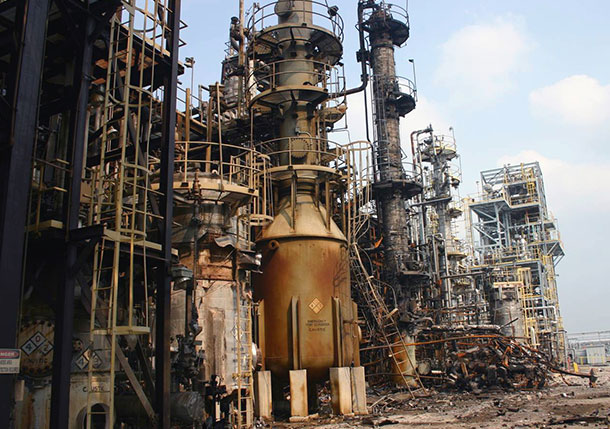Lindell contributes to U.S. report on chemical plant safety issues

Michael K. Lindell
Deadly chemical plant disasters like the 2008 explosion at the Bayer CropScience facility in Institute, West Virginia can be avoided or mitigated by the implementation of several proven safety protocols, concludes a federal [study] (http://dels.nas.edu/Report/Storage-Methyl/13385) of the incident undertaken in part by Michael Lindell, a professor of urban planning at Texas A&M University.
Lindell, a faculty fellow with the [Hazard Reduction and Recovery Center] (http://hrrc.arch.tamu.edu/) at the Texas A&M College of Architecture, contributed to the study's sections on risk and decision analyses and emergency management.
Ordered by Congress and aimed at enhancing plant safety throughout the U.S. chemical manufacturing system, the study was funded by the [U.S. Chemical Safety and Hazard Investigation Board] (http://www.csb.gov/) in the wake of a 2008 Bayer facility [explosion] (http://ehstoday.com/fire_emergencyresponse/news/csb-deficiencies-bayer-cropscience-explosion-0202) that killed two employees, sickened six volunteer firefighters, started a fire in the facility’s production unit and caused extensive damage to nearby structures. It focused on the use and storage of [Methyl isocyanate] (http://en.wikipedia.org/wiki/Methyl_isocyanate) , a dangerous organic compound used in the production of pesticides and the production of rubbers and adhesives.
The Bayer facility stored approximately 37,000 pounds the chemical, which was also responsible for the death of thousands and injury to tens of thousands in the infamous 1984 Union Carbide chemical plant [disaster] (http://www.guardian.co.uk/world/2009/dec/03/bhopal-anniversary-union-carbide-gas) in Bhopal, India.
Lindell is a member of the Chemical Safety and Hazard Investigation Board’s [Committee of Inherently Safer Chemical Processes] (http://dels.nas.edu/Committee/Committee-Inherently-Safer-Chemical-Processes/DELS-BCST-10-04) that conducted the investigation of the Bayer disaster.
The study found that Bayer and previous site owners had failed to perform assessments for safer processes on manufacturing highly toxic chemicals at the West Virginia plant. Also, the report showed that Bayer, citing technological, financial and other considerations, eschewed alternative manufacturing methods that could have reduced toxic chemical production and inventory.
The researchers recommended adoption of Inherently Safer Processing (ISP), an approach that calls for:
- Substituting less hazardous materials, chemistry or processes;
- Minimizing the quantity of hazardous materials and reducing the size of equipment that operates under hazardous conditions;
- Moderating hazards through the use of dilution, refrigeration or alternative processes that operate at less hazardous conditions;
- Reducing the potential impact of a plant disaster by locating hazardous facilities far form people and other developed property; and
- Simplifying the process by eliminating unnecessary complexity and designing user-friendly plants.
Tags
- archone gallery
- building a better texas
- environment
- feature
- hazard reduction & recovery
- hazards
- hrrc gallery
- landscape architecture & urban planning
- laup gallery
- research
- rss
- technology
Related Posts

HRRC marks 25th year championing resilience, planning

A&M researchers collaborate in U.S. resilience center

Study eyes how lower Lake Conroe levels impact economy

Faculty aid Harvey reportage, analysis
Follow Us
Facebook Twitter Vimeo Youtube Flickr RSS
Recent Posts

Planning prof heads study of disaster housing aid

A message from the dean

Former student remembered as expert planner

Leading educator named new head of Architecture Dept.






_thumbnail_small.png)
